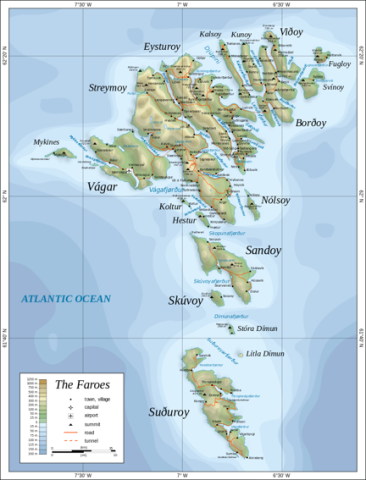[5] Reficiēbant autem semper ad vesperam. Aliquandō ventum habēbant; tamen ignōrābant ex quā parte veniēbat aut in quam partem ferēbātur nāvis. [6] Cōnsummātīs iam quadrāgintā diēbus et omnibus dispendiīs quae ad vīctum pertinēbant, appāruit illīs quaedam īnsula ex parte septentriōnālī, valdē saxōsa et alta.
[7] Cum autem appropinquāssent ad lītus illīus, vīdērunt rīpam altissimam sīcut mūrum, et dīversōs rīvulōs dēscendentēs dē summitāte īnsulae, fluentēs in mare. [8] Tamen minimē poterant invenīre portum ubi stetisset nāvis. Frātrēs enim vexātī erant valdē dē fame et sitī; singulī vērō accēpērunt vāscula ut aliquid dē aquā potuissent sūmere.
notes
After drifting for fourty days they were out of food, but an island appears. It has high cliffs, and they cannot find a place to land. Streams of water pours from the cliffs and the monks want to drink it.
Some readers imagine that they have now reached the Faroe Islands.
[5] Reficiēbant autem semper ad vesperam: they ate once a day, in the evening.
ignōrābant: bad weather perhaps made it impossible to see the stars.
[8] stetisset: in CL we would expect steterat.
Frātrēs enim vexātī erant: CL would be et frātrēs vexātī erant.
singulī: "each (of them)," subject of accēpērunt.
vocabulary
| reficiō reficere refēcī refectus | to restore, revive (transitive) (ML) to take food, eat (intransitive) 5 |
| vesperae –ārum f. pl. | pers, Evensong (ML) |
| īgnōrō īgnōrāre īgnōrāvī īgnōrātus | to not know; ignore |
| cōnsummō –āre | to consume (ML; CL to add up; complete; accomplish) 6 |
| quādrāginta; quādrāgesimus –a –um | 40; 40th |
| dispendium –ī n. | provisions, food supplies (ML; CL dispendium –(i)ī n.: expenditure) |
| vīctus vīctūs m. | food |
| septentriōnālis –e | northern |
| valdē | powerfully; intensely, exceedingly |
| saxōsus –a –um | rocky |
| appropinquō appropinquāre appropinquavī | to approach, draw near 7 |
| rīvulus –ī m. | a small stream, brook |
| summitas –ātis f. | top; surface [OLD 2] |
| minimē | No!, not at all8 |
| portus portūs m. | harbor |
| stō stāre stetī statum | to stand; to stand firm [OLD 3a] |
| vexō vexāre vexāvī vexātus | to afflict [OLD 4] |
| valdē | powerfully; intensely, exceedingly |
| sitis –is f. | thirst |
| vasculum (vāsculum) –ī n. | small vessel or container; jar |



